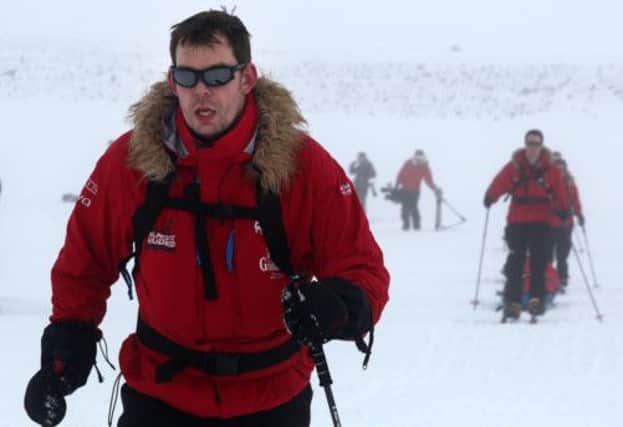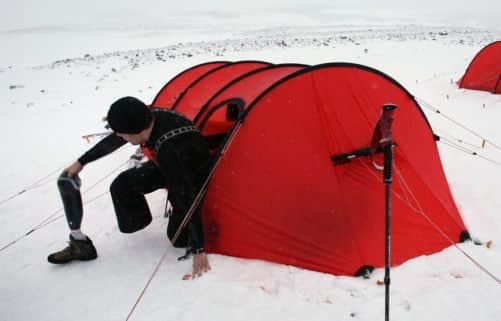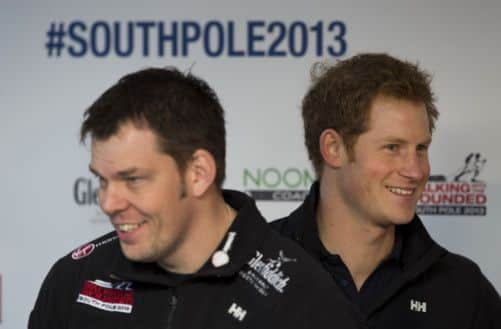Double amputee Scots soldier in South Pole bid


Sergeant Duncan Slater, 34, who served in the RAF infantry regiment, is a member of the UK team of wounded service men and women competing against other injured service personnel from the United States and the Commonwealth on the gruelling 208 mile race in Antarctica.
Today Prince Harry, who is joining the British team, met with all participants of the Walking With The Wounded South Pole Allied Challenge at Trafalgar Square in London as they unveiled the competition trophy.
Advertisement
Hide AdAdvertisement
Hide AdPrince Harry said: “These guys aim to achieve something quite remarkable, and in doing so, will prove to everybody else that even though you’ve lost a leg or lost an arm, or whatever your illness may be, that you can achieve pretty much anything if you put your mind to it.”


The race, sponsored by the Glenfiddich whisky company, starts on 30 November with teams aiming to reach the South Pole around 16 or 17 December, braving temperatures of -49C and 80mph winds.
Sgt Slater, a former gamekeeper from Muir of Ord, near Inverness, was seriously injured when his armoured vehicle was blown up by the Taleban in Babaji in Helmand Province in July 2009. He later had both his legs amputated below the knee.
During the year he spent in hospital confined to a wheelchair Sgt Slater said he found it impossible to believe he would never return to his unit.
“When they tell you these are the injuries you’ve got, you’re high as a kite on medication. Stupidly I thought when they said I’d broken my legs that I’d be back with the lads in six weeks for the end of the tour.


“Then one day when the doctor was on his ward round I asked “When am I going to be out of this place?” He basically had to close the curtains round my bed and said ‘you’re not going to make the end of the tour. You’re not going to be out of here any time soon. You’ll never be able to walk or run.
“I said ‘no, no, no you’re wrong’. I was in massive denial. I had to ask the nurses to draw the curtains round my bed and spent about three days crying into my pillow. Beforehand, before you get injured you are very proud, confident, part of the armed forces. When that is taken away your confidence goes.”
Surgery
In July 2010 Sgt Slater underwent surgery to have both legs amputated and was fitted for prosthetic legs.
Advertisement
Hide AdAdvertisement
Hide AdBut he began to notice the transformation of other injured soldiers returning from the Walking With The Wounded challenge to the North Pole in 2011.
“They had all changed, completely changed. One who was missing an arm had changed psychologically back to who he was before.”
Determined to turn his life around he fought off competition from 300 hopeful adventurers to win a place on the UK South Pole team.
Sgt Slater, who is married with a three-and-a-half year old daughter, Lily, underwent an arduous training and selection process in Iceland.
“Iceland was tough. You’ve got a hood up, goggles on and in complete isolation, unable to speak to people for maybe 10 hours a day skiing behind each other.
“I use the silence when I’m training to think of what I want to do with my life, what might be possible.
In my mind I go back to when I was a gamekeeper I did deer stalking and grouse and then moved to an estate nearer the coast where it was pheasant and roe-deer.
“I think being Scottish gives you a quiet confidence. Everyone is telling you how hard it’s going to be but I’m thinking the way Scottish people do ‘just get on with it’. We tend to be understated. The quiet reliables.”
Advertisement
Hide AdAdvertisement
Hide Ad“I find I’ve got a lot to think about. Very rare do you get hours to think about things and put it all to rights. I think ‘what will I do next? I need to get a job. I need to work out a plan’”.
“It’s just you and the elements. I think and I will be thinking of home. Of my gran who died last year. She lived all her days in Scotland and I’ve got a lot of memories of her.”
Edward Parker, co-founder of Walking With The Wounded, said: The Walking With The Wounded South Pole Allied Challenge will demonstrate the close bond between the UK forces and our allies both on and off the battlefield.
“There is no doubt that the young men and women who take part in our expeditions are an inspiration; they prove what is possible post-injury given the right support.”